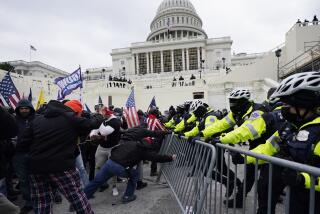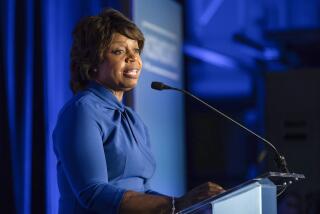Clinton Ventures Onto Unfriendly Turf : Politics: President hopes to deliver enough uncommitted black votes in Virginia to help Robb beat North, keep Senate in Democrats’ hands.
- Share via
WASHINGTON — Virginians don’t care for Democratic presidents in general. And the polls show that most of them don’t like Bill Clinton in particular.
Yet in an election year when he is avoiding many conservative states, President Clinton made his first political foray Monday into the the Old Dominion on a hunch that he could raise money and deliver Democratic voters for beleaguered Sen. Charles S. Robb (D-Va.).
The key: The many uncommitted black voters who could still enable Robb to edge ahead of front-running Republican candidate Oliver L. North--and perhaps save Democratic control of the Senate.
In a year when congressional control is at stake, the African American vote is important, said Joan Baggett, the White House political director. “We’re reaching out for it wherever we can.”
Clinton’s appearance for Robb at a pair of fund-raisers underscores a broader imperative facing the Democrats as they try to hold the congressional seats needed to ensure Clinton’s viability.
In race after race, they need to energize a Democratic core that is big enough to be decisive in the year’s many tight races but has sharply cooled to Clinton since the Democrats’ season of hope two years ago.
The importance of the party base is always magnified in midterm elections, when only one-third of registered voters are expected to show up, compared to the roughly half who vote during presidential election years. The no-shows tend to be people from lower on the socioeconomic scale--”read, Democratic voters,” said Mark A. Siegal, a newsletter publisher and former Democratic Party official.
This year there is abundant evidence from primaries and polls that, while many conservative voters are excited about the election, such reliable Democratic groups as labor and black voters are torn by an ambivalence that could severely depress their turnout.
Union members, while pleased at Clinton’s advocacy of health reform, were disappointed at its failure. They also actively fought the Administration’s efforts on behalf of two big trade agreements in the last year.
More than 70% of black voters approve of Clinton’s performance, the polls show, compared to about 40% for the electorate as a whole.
Yet if they like him overall, their passion has been cooled by Clinton’s advocacy of budget-cutting, capital punishment, prison-building and free trade.
“You could make a good case that the (black) turnout--or lack of it--could decide five or six elections,” Siegal said. These could include close Senate races in California, Minnesota, New Jersey and Massachusetts, he said.
But it is not always a simple matter to turn out the Democratic core without mobilizing the opposition at the same time.
Highly visible appearances by the President, First Lady Hillary Rodham Clinton or national party leaders will bring out Democratic fans but also may give energy to Clinton-haters and potentially turn some swing voters as well.
“So to the extent you jack up the turnout, you may also be increasing the hostile vote,” said Stuart Rothenberg, a political analyst in Washington.
In Virginia, North is clearly counting on just that effect to help him.
This is a state that has not gone for a Democratic President since Lyndon B. Johnson’s landslide of 1964. North, who has built his campaign on attempts to associate Robb with Clinton, greeted the President’s visit with new 30-second TV ads designed to pound home that connection.
Analysts predicted that pictures of Clinton and Robb at the fund-raisers soon will be splashed over North’s campaign flyers.
There is reason to believe that Clinton could make a difference, however, because large numbers of black voters remain uncommitted.
Only three weeks ago, former Gov. L. Douglas Wilder, rather than Robb, was expected to get most of these votes.
When third-running Wilder dropped out of the race on Sept. 15, most analysts expected his bitter rival, Robb, to win the allegiance of most black voters. But that has not occurred.
Instead, according to a poll released last week, about 34% of black voters have moved over to the undecided column. Robb’s 33% share of the overall electorate has remained the same and North has held his 35% lead.
The poll, by the Mason-Dixon PMR firm, found that last-running Coleman had inherited more of the Wilder vote than Robb and had moved up from 13% to 18%.
Analysts said that the big undecided vote may reflect the reluctance of former Wilder voters to join the camp of a politician Wilder had fought--and publicly denounced--for so many years.
Black Virginians “generally like Clinton: They think he is interested in their issues,” said Del. Gerrauld Jones (D-Norfolk), chairman of the Joint Legislative Black Caucus, in the Virginia General Assembly.
More to Read
Get the L.A. Times Politics newsletter
Deeply reported insights into legislation, politics and policy from Sacramento, Washington and beyond. In your inbox twice per week.
You may occasionally receive promotional content from the Los Angeles Times.











